Entering the Electronic Age
In his 2004 State of the Union address, President Bush outlined a plan to ensure that most Americans have electronic health records within the next 10 years, which will make shared knowledge and the free flow of information much easier. Electronic medical records (EMRs) that include reminder systems and computer-assisted diagnosis and management have shown to improve compliance with practice guidelines.2 A 2001 study conducted by the Boston Consulting Group found that 92% of EMRs users reported that EMRs have improved their overall efficiency, whereas 88% said they have improved the quality of the care they deliver to patients. About half the users in both cases described the impact as major. This means that EMRs are indeed liberating doctors from the hassle of documentation so they can concentrate on providing better care.3
Explore This Issue
October 2007Utilizing software programs, such as the Patient Safety Indicators prepared by the Agency for Healthcare Research and Quality (AHRQ) (www.qualityindicators.ahrq.gov ), can help hospitals identify potential adverse drug events (ADEs) occurring during hospitalization. This tool uses readily available hospital inpatient administrative data and is free from AHRQ.
Transparency is improving, as health care professionals are more willing to voluntarily report errors to national and proprietary error reporting systems without fear of legal retribution. The Medication Errors Reporting Program, operated by the US Pharmacopoeia-Institute for Safe Medication Practices, and MEDMARX® (www.usp.org ) are two examples of nonpunitive, anonymous, voluntary reporting programs. The Food and Drug Administration’s (FDA) safety information and adverse event reporting program, MedWatch (www.fda.gov/medwatch/how.htm ), is another resource.
If this sounds like a lot of work, it is-but it can and must be done, and there are success stories to prove it, said Dr. Shine during his presentation. The Iowa Health System in Des Moines reduced ADEs across its entire system of 10 hospitals by 75 percent in just one year. St. Joseph Medical Center in Bloomington, Illinois, reduced ADEs per 1000 doses by more than 50 percent in less than one year.
A Culture of Safety
These institutions encouraged a culture of safety by instituting such things as (1) patient safety leadership WalkRounds, during which senior leaders encourage frontline staff to identify opportunities for improvement and make suggestions, (2) safety briefings, during which good ideas for change are exchanged, and (3) reconciling medications so patients know the medications they are taking while hospitalized.

Leave a Reply